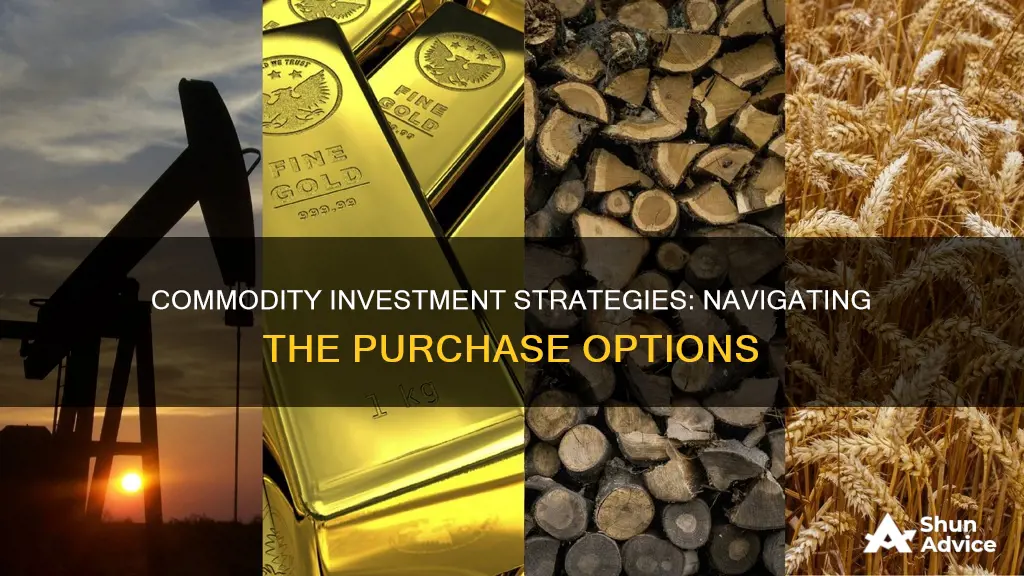
Investing in commodities can be a great way to diversify your portfolio and protect against inflation. Commodities are raw materials that can be transformed into other goods and services, such as gold, oil, and agricultural products. There are several ways to invest in commodities, each with its own risks and benefits.
One way to invest in commodities is through futures contracts, which are agreements to buy or sell a specified amount of a commodity at a specified price and date in the future. Another option is to invest in stocks of companies that produce or are otherwise related to the commodity. For example, investing in oil companies or gold mining businesses. You can also purchase physical commodities, such as gold bars or coins, though this requires storage and insurance.
Additionally, there are exchange-traded funds (ETFs), mutual funds, and exchange-traded notes (ETNs) that focus on commodities. These provide exposure to a commodity or a group of commodities and are typically traded like stocks.
Before investing in commodities, it's important to understand the risks involved, such as volatility and the impact of external factors like geopolitics and weather conditions. Commodities are best suited for sophisticated investors with a high-risk tolerance and a good understanding of the market.
| Characteristics | Values |
|---|---|
| Types of commodities | Energy, Metals, Agricultural Products, Livestock |
| How to invest in commodities | Physical ownership, Mutual funds, Exchange-traded funds (ETFs), Exchange-traded notes (ETNs), Futures contracts, Individual securities, Alternative investments |
| Risks | Volatility, Speculative, Geopolitical events, Weather, Concentration |
| Benefits | Inflation protection, Low correlation to other assets, Hedge against other investments |
What You'll Learn

Buying physical commodities
One of the most popular physical commodities to invest in is gold. Gold is often used as a physical store of value and as a hedge against downturns in the financial markets. Investors can purchase gold bullion, with a standard size and purity, from online dealers or pawn shops, or they can buy gold coins. However, it is important to be careful that you are getting close to the spot price on purchases and avoid paying up for collector's value on coins.
Another popular physical commodity to invest in is silver. Silver has a similar hedge angle to gold and shares some common traits with gold in terms of collectibility and jewelry. However, silver also has industrial applications that play a role in its demand.
Other physical commodities that can be purchased include platinum, copper, palladium, and zinc.
It is important to note that owning physical commodities comes with issues of storage, insurance, and liquidity. Commodities beyond precious metals have additional storage issues due to larger quantities and shelf life constraints. Therefore, most commodities investors do not pursue physical ownership. Instead, they trade physical commodities through reputable dealers and storage facilities.
Human Capital: The Investment in People
You may want to see also

Using futures to invest
Futures contracts are a direct way to invest in commodities. They are an agreement to buy or sell a specified amount of a commodity at a specified price and date in the future. Investors use leveraged margin accounts to allow them to take larger positions with their existing capital. Most trades are cash-settled, meaning an investor won't have to worry about taking delivery of the commodity.
Opening an account to trade futures contracts will likely require some additional paperwork to enable margin trading, as well as a higher account minimum. The specific maintenance margin needed in an account varies with the value of the contract being traded.
Futures are a high-risk, high-reward way to speculate on a given commodity. They allow you to put up relatively little money to open a contract, and you can use the power of leverage to quickly win (or lose) a fortune. As long as the trade goes your way, you won't have to put up more money on the contract. However, if the trade moves against you (below your maintenance margin), you'll have to keep adding money to hold it open.
Futures contracts are available for every kind of commodity. Generally speaking, two types of investors engage in the futures markets for commodities: commercial or institutional users of the commodities and speculative investors.
Commercial and institutional purchasers of futures use contracts as part of their budgeting process and to mitigate shifts in cash flow. For example, an airline might use futures contracts to lock in fuel prices for a certain period, protecting themselves from unpredictable swings in crude oil and gasoline prices and securing more predictable and stable operating costs. Farming cooperatives may also employ futures contracts to hedge against market volatility.
Speculators in commodities futures tend to be sophisticated investors or traders who purchase assets for short periods and employ certain strategies to profit from price changes. Speculative investors hope to profit from changes in the price of the futures contract. These types of investors typically close out their positions before the futures contract is due, so they never take actual delivery of the commodity itself.
There are advantages to using futures contracts to participate in the commodities market. Analyzing particular investments is simplified because it's a "pure play" on the underlying commodity. This means that you can focus solely on the price moves of the commodity itself without dealing with the complexities of company-specific factors that can affect stocks. In addition, futures trading can lead to significant profits, partly because futures contracts allow for high leverage: with a minimum deposit account, investors can control full-size contracts.
However, while this can magnify profits, it also increases the risk of considerable losses. Therefore, futures trading requires careful risk management and is generally more suitable for experienced investors. The markets can be very volatile, and direct investment in commodity futures contracts can be very risky, especially for inexperienced investors. If a trade goes against you, you could lose your initial deposit and more before you have time to close your position.
Most futures contracts offer the ability to purchase options. Futures options can be a lower-risk way to enter the futures markets. One way of thinking about buying options is that it's like putting a deposit down on something instead of purchasing it outright. With an option, you have the right—but not the obligation—to follow through on the transaction when the contract expires. Hence, if the price of the futures contract doesn't move as you anticipated, you have limited your loss to the cost of the option.
The Future of Telemedicine: Empowering Active Users Through Innovation
You may want to see also

Using stocks to invest
When you buy stocks of companies that are involved in the production or processing of commodities, you are betting on the performance of those companies. The value of these stocks is often tied to the price of the underlying commodity. For example, if oil prices go up, an oil company's profits may increase, leading to a rise in its stock price. Similarly, if gold prices rise, a gold mining company's stock may also increase in value.
There are a few things to keep in mind when investing in commodity stocks. First, it is important to carefully research and analyse the company before investing. Commodity industries are subject to boom and bust cycles, and companies in these industries often require a lot of capital. Investing in individual stocks can be risky, especially if you are investing in a small number of companies. To mitigate this risk, it is advisable to invest in a diversified group of stocks or consider investing in exchange-traded funds (ETFs) that hold a portfolio of commodity stocks.
Another thing to consider is that the performance of commodity stocks is not solely dependent on the price of the underlying commodity. Other factors, such as company management, market share, and operational efficiency, can also impact the stock price. Therefore, investing in commodity stocks may not perfectly track the price of the commodity.
Overall, investing in stocks of commodity-producing companies can be a good way to gain exposure to commodities without taking on the same level of risk as investing directly in physical commodities or futures contracts. It allows investors to benefit from the rise in commodity prices while also considering the performance and prospects of the individual company.
Invest in IoT's Future Today
You may want to see also

Using ETFs and notes to invest
Exchange-traded funds (ETFs) and exchange-traded notes (ETNs) are other ways to invest in commodities. These funds combine the money from many small investors to build a large portfolio that tries to track the price of a commodity or a basket of commodities. For example, you could invest in an ETF that owns gold, oil, or even a combination of commodities.
ETFs and ETNs trade like stocks and enable you to speculate on fluctuations in commodity prices without investing directly in futures contracts. You don't usually need a special brokerage account to put money into an ETF or ETN. There are also no management or redemption fees with ETFs and ETNs because they trade like stocks. However, not all commodities have ETFs or ETNs associated with them.
One downside is that a major change in the price of the commodity might not get reflected point for point in the underlying ETF or ETN. In addition, ETNs have credit risk associated with them since they are backed by the issuer.
Investments: Where Does the Money Go?
You may want to see also

Using mutual and index funds to invest
Mutual funds and index funds are a great way to gain exposure to commodities without actually having to purchase a physical commodity or other complicated instruments, such as futures or options. They are also a great way to diversify a portfolio of stocks and bonds.
Commodity mutual funds typically invest in both the stocks of companies involved in commodities, such as mining companies, and in commodities themselves. One advantage of this approach to commodity investing is that commodity mutual funds may perform well even when commodity prices overall are not. Mining company stocks may rise even during a period when the spot price of the mined commodity is falling. Other factors in addition to commodity prices that impact the stock prices of companies in commodities-related businesses include the companies' debt and cash flow situations.
Commodity funds can be split into several distinct types of investments. These include:
- Commodity funds with direct holdings in commodities, such as a gold fund that holds gold bullion
- Commodity funds that hold futures, such as commodity-linked derivative instruments
- Natural resource funds that invest in companies that are engaged in businesses that operate in commodity-related fields, such as energy, mining, oil drilling, and agricultural businesses
- Combination funds that invest in a combination of actual commodities and commodity futures, such as gold funds that have underlying holdings that include both bullion and futures contracts
Commodity mutual funds can also act as a hedge against inflation, depending on the specific commodity. Historically, commodities have had a low correlation to traditional equity markets, meaning that they do not always fluctuate in tandem with market movements. For many investors, achieving this low correlation is the primary objective when seeking to add diversification to a portfolio.
Some examples of commodity mutual funds include:
- Gabelli Gold Fund Class A (GLDAX)
- Invesco Balanced-Risk Commodity Strategy Fund Class A (BRCAX)
- BlackRock Commodity Strategies (BICSX)
Madoff Victims: A Long List of Investors
You may want to see also







